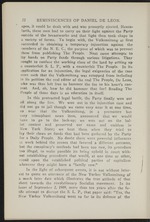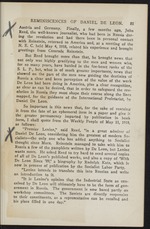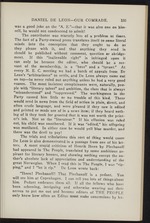| 1 |
 |
“...estopped from including
in its petition the real editor of the real The People, De Leon,
who was thus left free to hammer the foe to his hearts con-
tent. And, oh, how he did hammer that foe I Reading The
People of those days is an education in itself.
In this protracted legal battle, the Party finally won out
all along the line. We won out in the injunction case and
did not go to jail though we came very near it at one time,
so near that the Volkszeitung, in a premature but
very triumphant news item, announced that we would
have to go to the lock-up; we won out on the bal-
lot contest and preserved our name and emblem in
New York State; we beat them when they tried to
lay their claws on funds that had been gathered by the Party
for a Daily People. No doubt there were powerful influences
at work behind the scenes that favored a different outcome,
but the conspiracys methods had been too raw, its procedure
too illegal, to make possible its being upheld in court with-
out establishing precedents...”
|
|
| 2 |
 |
“...L. P, but what IS of much greater importance, news that
showed on the part of the men now guiding the destinies oj
Russia a clear and keen perception of the value of the work
De Leon had been doing m America, plus a clear recognition
oLrioT-^V"- safeguard the rev-
olution m Russia they must shape their course along the lines
mapped, for the guidance of the International Proletariat by
Daniel De Leon. * ^
So important is this news that, for the sake of rescuing
It from the fate of an ephemeral item in a paper and give it
the greater permanency imparted by publication in book
IrTollows^ ' Weekly People of May 11, 1918,
Premier Lenine," said Reed, "i* a great admirer of
Daniel De Leon, considering him the greatest of modern So-
"i/ one who has added anything to Socialist
thought since Marx. Reinstein managed to take with him to
Russia a few of the pamphlets written by De Leon, but Lenine
wants more. He asked Reed to try hard to send several copies
of all of De Leon s pubHshed works, and also...”
|
|
| 3 |
 |
“...to settle, and De Leon always came out
on tophe never ruled out anything unless he had a very good
reason. The most insistent complainants were, naturally, peo-
ple with literary talent and ambition, the class that is always
"misunderstood and suppressed. The workingmen in the
Party caused him little or no trouble of this kind. These
would send in news from the field of action in plain, direct, and
often crude language, and were pleased if they saw it edited
and printed or made use of in a news item; if they heard noth-
ing of it they took for granted that it was not worth the print-
ers ink. Not so the literateur, If his effusion was ruled
out, his child was smothered. If it was "edited, his offspring
was mutilated. In either case he would yell blue murder, and
there was the devil to pay!
The trials and tribulations this sort of thing would cause
De Leon is also demonstrated in a passage from one of his let-
ters. A most stupid criticism of Henrik Ibsen by Plechanoff
had appeared in The...”
|
|
